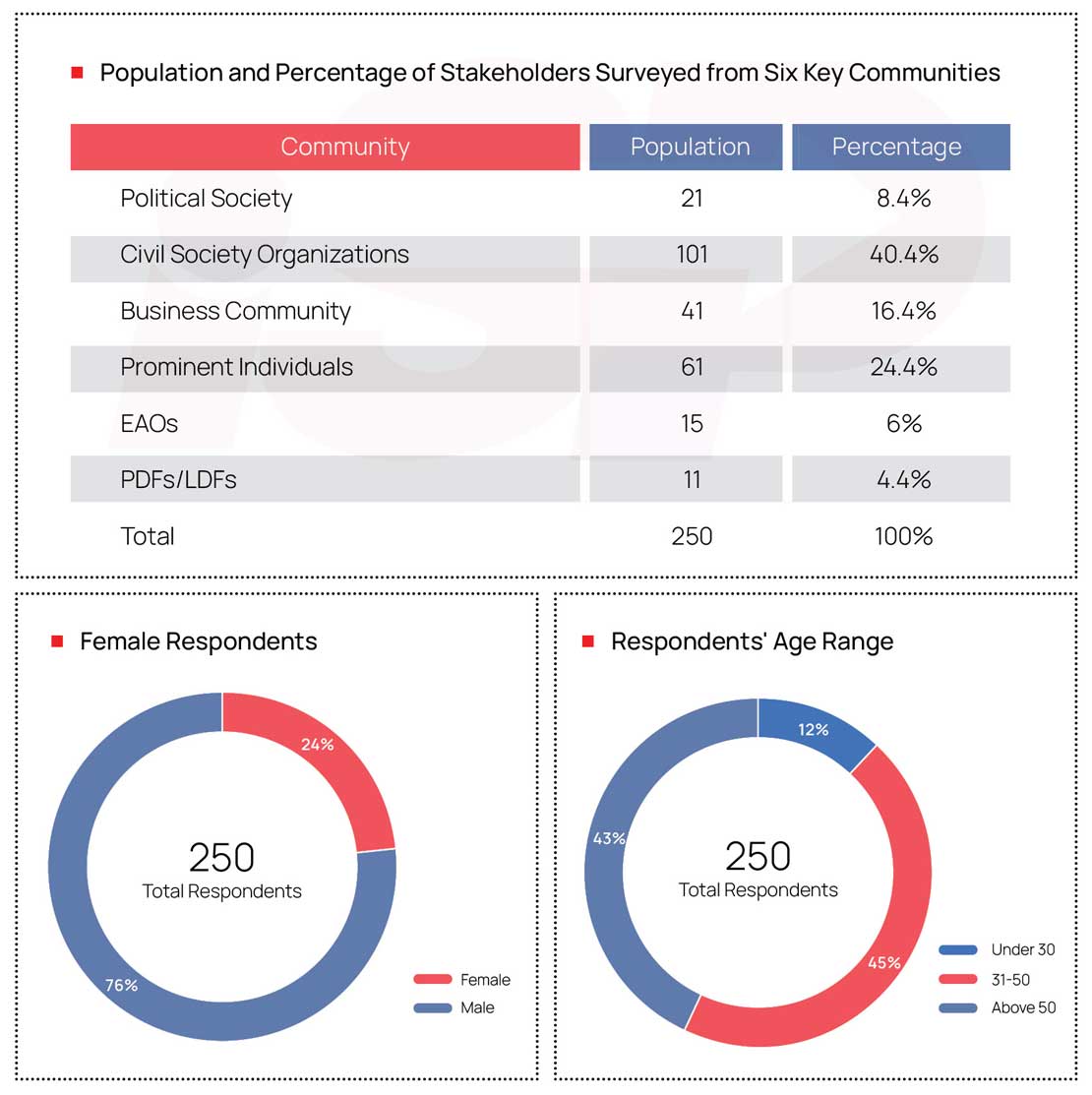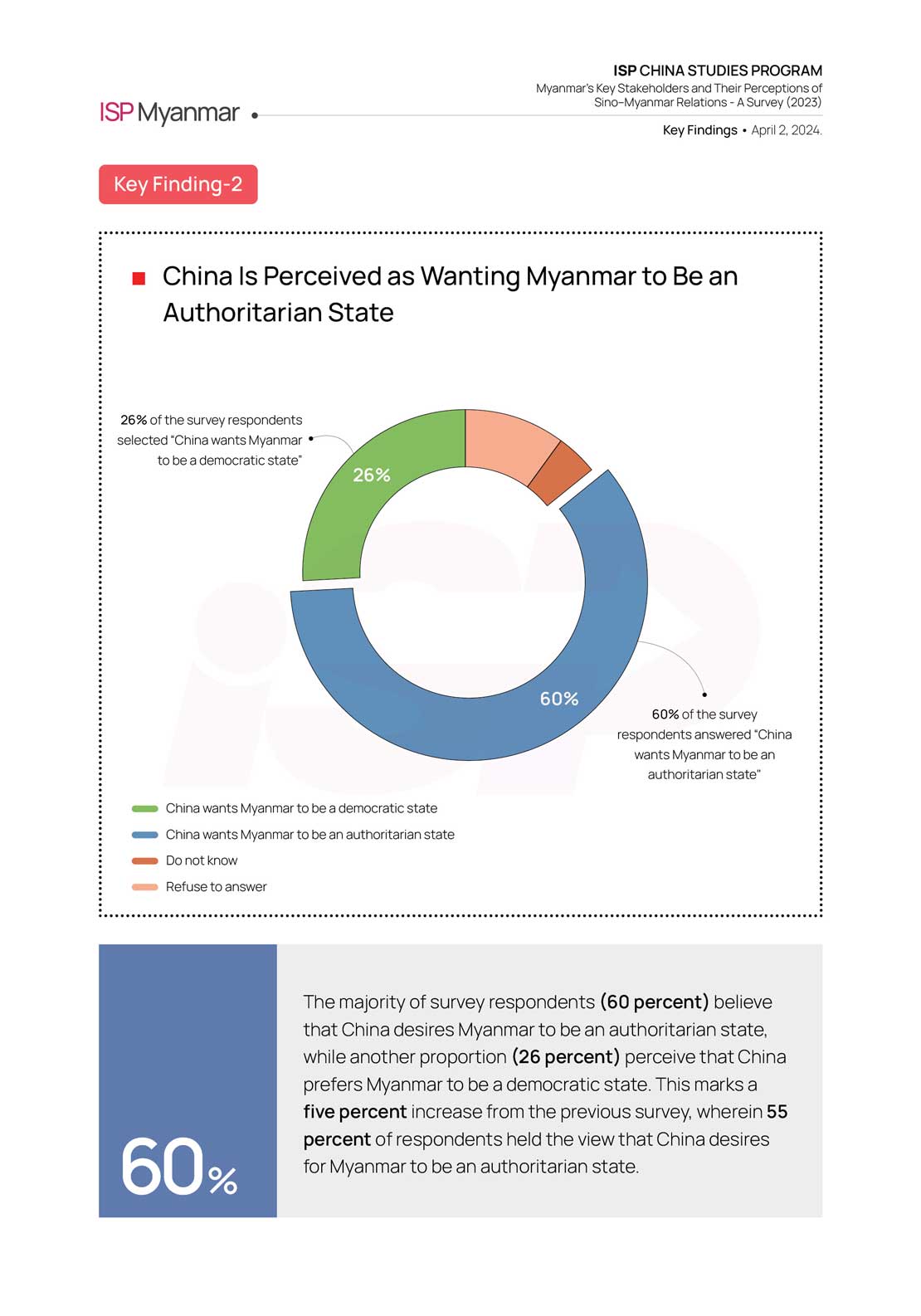The “Key Findings” of the survey (English version) is published on April 9, 2024 as a translation of the original Burmese version published on April 2, 2024.
About the Survey
Since 2022, ISP-Myanmar has been conducting an annual survey titled “Myanmar’s Key Stakeholders and Their Perceptions of Sino–Myanmar Relations”. The objective is to gather specific insights from key individuals within Myanmar’s policy communities to identify similarities and differences in their perceptions of the key factors influencing Sino–Myanmar relations.

This marks the survey’s second iteration, in which 250 individuals from six different key stakeholder groups within Myanmar’s policy communities were presented with 100 questions. The survey was conducted from October to November 2023.
The survey respondents encompass six key stakeholder groups: (1) Political Society, (2) Civil Society Organizations (CSOs), (3) Business Community, (4) Prominent Individuals, including scholars and activists, well versed in China’s political, economic, and international affairs, (5) Ethnic Armed Organizations (EAOs), and (6) the emerging People’s Defense Forces/ Local Defense Forces (PDFs/ LDFs)operating in areas where China’s investments are located. During the survey period, the three Brotherhood Alliance (3BHA) and its allied forces launched Operation 1027 in northern Shan State. In response, additional survey questions were incorporated, and further discussions were held with 20 key stakeholders from different communities to explore the implications of the operation for China-related issues.
The survey encompasses inquiries into various aspects of the post-coup scenario in Myanmar, including the ongoing political crisis, China’s involvement in the peace process, and the economic dynamics between China and Myanmar. Additionally, it delves into general perspectives on other China-related issues as well as questions aimed at perceptions regarding China’s Belt and Road Initiative (BRI), the Regional Comprehensive Economic Partnership (RCEP) and other China-led regional integration plans, China’s soft power initiatives, and the use of China’s digital and telecommunication technologies and trust on them. Although the initial target was 300 key stakeholder respondents, the survey was completed with responses from 250 individuals. This marks an increase of 35 respondents compared to that of last year. Additionally, there has been an increase in female participation, with 59 individuals (24 percent of the 250 respondents) being female, compared to 49 individuals (22.8 percent of 215 respondents) last year. ISP-Myanmar is grateful to the People’s Alliance for Credible Election (PACE) for their excellent technical support and cooperation throughout the survey process. The full survey will soon be published on the ISP-Myanmar website.
Survey Brief
The survey indicates that there is no significant gap between individuals who perceived China to be a good neighbor and those who disagreed with this perception. However, there appears to be concerns about China’s economic influence and its status as Myanmar’s largest economic partner. Additionally, there was significant agreement on the growing dependency on China regarding trade, investments, peace process, politics and diplomacy as well as technology and security sectors following the 2021 coup. Regarding China’s approach to Myanmar, most respondents shared the view that China’s approach is pragmatic, focusing on fostering good relations with whoever is in power in Myanmar. The majority of respondents also perceived that China intervenes in Myanmar’s domestic affairs.
An intriguing finding within Myanmar’s policy community was that many respondents were unaware of China’s major regional cooperative projects.It is also noteworthy that a significant portion of respondents expressed disagreement with the ongoing implementations of the China–Myanmar Economic Corridor (CMEC) projects. Furthermore, respondents perceived that China–Myanmar economic relations would undergo development after three years, starting in 2026.
The majority of respondents continue to hold strong views that China’s governance, economic development, and concept of democracy with China’s characteristics are not ideal for Myanmar, despite China’s efforts to build relations in various sectors of Myanmar through soft power. Specifically, most leaders of ethnic armed organizations (EAOs) do not consider China’s governance an ideal model. However, there is still a perception among respondents that China holds influence over EAOs in Northern Shan State. Many respondents also indicated that their perceptions remain unchanged despite the ongoing Operation 1027.













